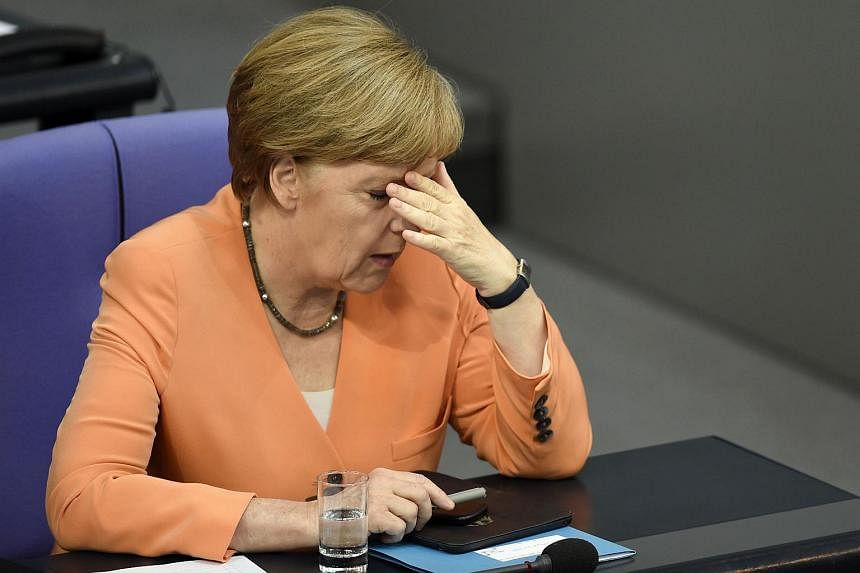ATHENS (AFP) - European leaders were scrambling for a response Monday after a resounding "No" from Greek voters in a momentous referendum on austerity which could send the country crashing out of the eurozone.
With exposure of up to 82 billion euros, and growing pressure from anti-bailout forces in Berlin, Germany's chancellor Angela Merkel heads to Paris on Monday afternoon for crisis talks with French president François Hollande.
The Irish Times described Dr Merkel as "caught off-guard" by the outcome of the vote. It said the risk-averse German leader had gambled on an an unusually high-risk strategy last week and refused eleventh-hour approaches from Athens until after the snap vote.
As the first results came in last night, Dr Merkel stayed out of sight, but close allies said her trust in the Greek prime minister was now "effectively destroyed", according to the Irish Times.
The German and French leaders spoke by telephone late Sunday, declaring the decision must "be respected" and calling for an emergency eurozone summit which European Union president Donald Tusk said would be held on Tuesday.
A flurry of other meetings will also be held Monday as European leaders sized up the implications of the vote, a victory for Greece's radical left-wing Prime Minister Alexis Tsipras, who insisted it did not mean a "rupture" with Europe.
With the ramifications still unclear and some analysts putting the chances of a "Grexit" at "very high", European Commission head Jean-Claude Juncker was to hold a teleconference on Monday morning with European Central Bank chief Mario Draghi, Tusk and Eurogroup head Jeroen Dijsselbloem.
Meanwhile German and French finance ministers were set for talks beginning in Warsaw at 0800 GMT on Monday (4pm in Singapore), while the Euro Working Group of top treasury officials will meet in Brussels.
European leaders had reacted with a mix of dismay and caution to the figures released by the Greek interior ministry early Monday showing the final tally in the referendum at 61.31 percent "No" and 38.69 percent "Yes", with turnout at 62.5 percent.
Tsipras has "torn down the bridges" between Greece and Europe, Merkel's deputy chancellor, German Economy Minister Sigmar Gabriel, told the Tagesspiegel newspaper.
Despite the Greek premier's assertions, new bailout negotiations now were "difficult to imagine", he said.
Dijsselbloem called the Greek "No" result "very regrettable for the future of Greece".
In a televised address after the referendum, Tsipras insisted the vote did not mean a break with Europe. He has emphasised that euro membership is meant to be "irreversible", with no legal avenue to boot a country out.
"This is not an mandate of rupture with Europe, but a mandate that bolsters our negotiating strength to achieve a viable deal," he said.
Tsipras said the creditors - the ECB, the EC and the International Monetary Fund (IMF) - would now finally have to talk about restructuring the massive, 240-billion-euro (S$358 billion) debt Greece owes them.
"This time, the debt will be on the negotiating table," he said.
Thousands of people in Athens gathered to celebrate the "No" vote Sunday night, punching the air, kissing and cheering.
"Spain, and then Portugal, should follow this path. We're for a Europe of the people," said Giorgos, 25, brushing off concerns the result could see the debt-laden country plunge further into the financial mire.
But the mood of jubilation was not shared by all "No" voters, with some saying they had been confronted with an impossible choice.
Even "Yes" voters were ambivalent about their camp's apparent defeat.
Paris, a 41-year-old dentist, said she was resigned rather than sad because, with the dire state of Greece's finances and Tsipras in power, there was "no real hope either way".
Greece is teetering on the brink of financial collapse. If it does not receive cash and loans soon from European institutions, it could still be forced to resort to government IOUs or a return to the drachma to keep its economy running.
Greek banks are now reportedly almost illiquid after a run by panicked customers in the lead-up to the referendum, which Tsipras abruptly called on June 27 to break an impasse with the creditors.
A weeklong closure of the banks and capital controls that included restricting daily ATM withdrawals to just 60 euros ($67) and blocking money transfers abroad slowed the outflow.
But if the ECB does not inject emergency euros into Greece's banks in the next one or two days, more businesses will go belly up and ordinary Greeks will suffer.
Government spokesman Gabriel Sakellaridis said late Sunday that the Bank of Greece was asking for the ECB to provide money under its Emergency Liquidity Assistance mechanism.

